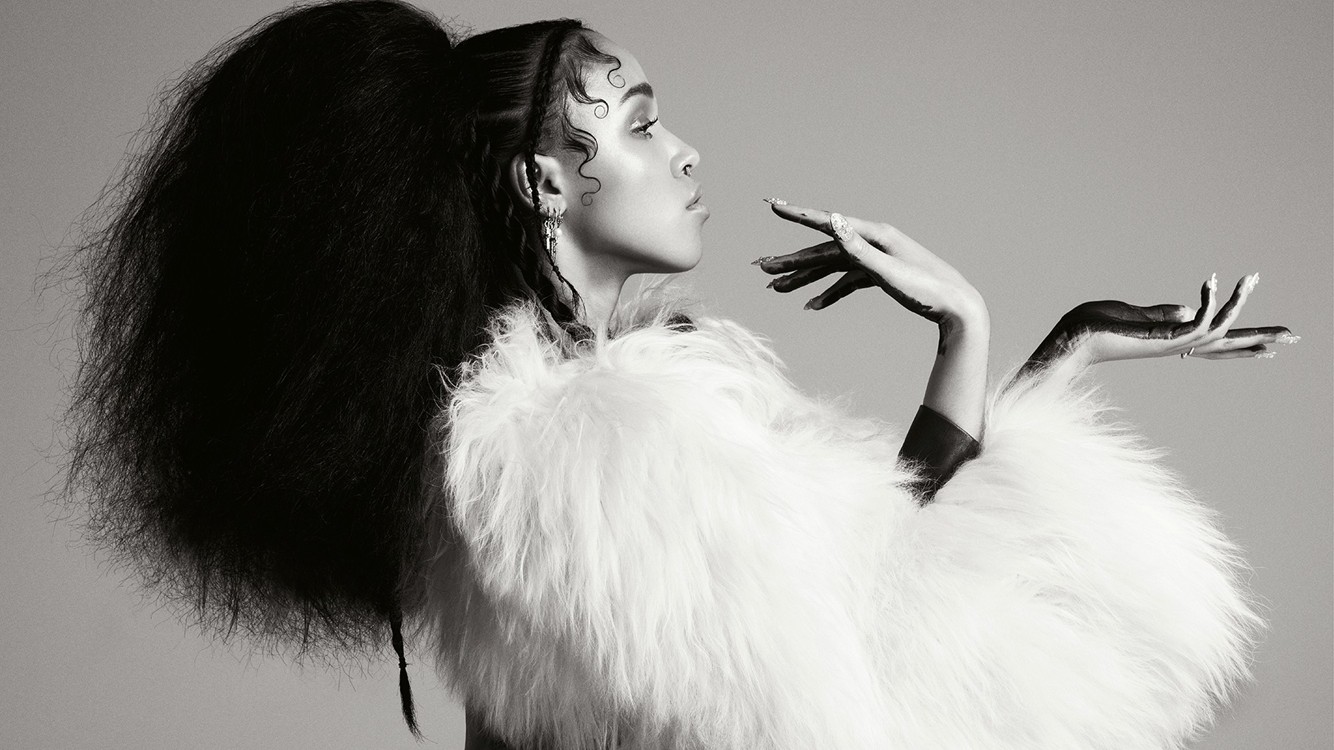 On any given Sunday, millions of Americans head to church, and millions of others do not. For those of us non-churchgoers, entering a parish for say, a funeral or wedding, can be an overwhelmingly sensory experience. The immensity of space, the way voices carry, the light refracting off of stained glass—it is all rather disorienting if you are not accustomed to the environment. Listening to FKA twigs’ LP1 for the first time imparts a similar sensation to entering a church. She creates a sacred space, the sonic equivalent of towering walls and vast stillness. “I love another, and thus I hate myself,” she repeats, quoting Sir Thomas Wyatt. The track’s musical backbone stutters, decays, then builds itself back up. Her chant weaves in and out of your ears until the words are no longer hers, or Wyatt’s, but your own internal monologue. FKA twigs has arrived.
On any given Sunday, millions of Americans head to church, and millions of others do not. For those of us non-churchgoers, entering a parish for say, a funeral or wedding, can be an overwhelmingly sensory experience. The immensity of space, the way voices carry, the light refracting off of stained glass—it is all rather disorienting if you are not accustomed to the environment. Listening to FKA twigs’ LP1 for the first time imparts a similar sensation to entering a church. She creates a sacred space, the sonic equivalent of towering walls and vast stillness. “I love another, and thus I hate myself,” she repeats, quoting Sir Thomas Wyatt. The track’s musical backbone stutters, decays, then builds itself back up. Her chant weaves in and out of your ears until the words are no longer hers, or Wyatt’s, but your own internal monologue. FKA twigs has arrived.
FKA twigs is the musical project of Tahlia Barnett, a London-based songwriter who got her start as a backup dancer in several popular music videos. Her debut EP 1 was self-released back in December of 2012 before being picked up by the Young Turks label (home of The xx and SBTRKT). Hype built like wildfire around the strength of her track “Water Me,” and before long FKA twigs became one of the most enigmatic figures in music. Her first full-length, fittingly titled LP1, saw the light of day on August 6th of this year. It is the rare debut that arrives fully-realized and capitalizes on her unique vision.

 LP1’s first single “Two Weeks” is a monstrous track that instantly staked a claim as one of the year’s best songs. FKA twigs is sometimes compared to a modern version of Aaliyah, and this track presents the strongest support for that argument. While the aura of 90’s R&B can be felt in her voice and melodies, it is a decidedly forward-thinking song that does not rely too heavily on nostalgia. Her delivery of lines such as “higher than a motherfucker, dreamin’ of you as my lover” easily outclasses her modern peers.
LP1’s first single “Two Weeks” is a monstrous track that instantly staked a claim as one of the year’s best songs. FKA twigs is sometimes compared to a modern version of Aaliyah, and this track presents the strongest support for that argument. While the aura of 90’s R&B can be felt in her voice and melodies, it is a decidedly forward-thinking song that does not rely too heavily on nostalgia. Her delivery of lines such as “higher than a motherfucker, dreamin’ of you as my lover” easily outclasses her modern peers.
The most intriguing aspect of LP1 is FKA twigs’ distinct grasp of feminism. She eschews a one-dimensional interpretation of womanhood for a narrative that is wounded yet unyielding, provocative yet in-control. “When I trust you, we can do it with the lights on,” she tells a lover on “Lights On,” making a grand statement about relationships. On the previously mentioned “Two Weeks,” she is a temptress, cooing “you say you want me, I say you’ll live without it.” For FKA twigs, feminism is more than sexuality. Trust and autonomy precede sex. She is certainly not immune to the ache of love and lust, but that does not make her any less powerful of a figure. Her character is profoundly human and complex.
As LP 1 progresses beyond these initial tracks, there is an imposing sense of decay. Creaking noises begin to rise from the melodies. The sound of nervous ticking accelerates like a clock spinning out of control. “Video Girl” explores her discomfort around being recognized in public as a backup dancer. The brilliant production of “Numbers” repeatedly erases her voice, like someone is hitting backspace while she tries to spit the words out.

The album closes with “Kicks,” in which FKA twigs yearns for another and finds solace in masturbation. “I just touch myself and say, I’ll make my own damn way,” she sings with disarmingly flat affect. Candid admissions such as this feel monumental against the glitchy soundscape that supports them. It is an unsettling end for this journey, but still finds our protagonist in control.
Some have complained that the hype surrounding FKA twigs is overly based on the shroud of mystery she has created over the past year. And yet, for all its weirdness and distortion, LP1’s appeal is fairly straightforward. The strength of this album lays in its creator, not marketing, and FKA twigs has cemented her place as one of the most compelling voices in music today.
Rating: 4.5/5


